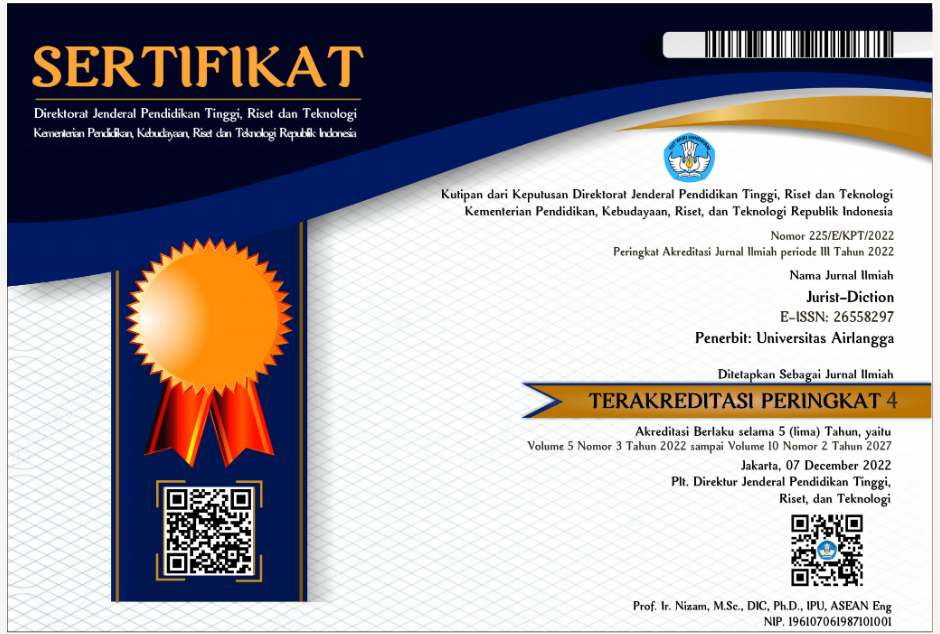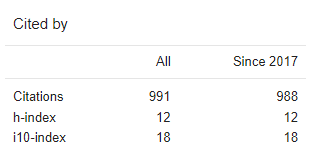Status Kewarganegaraan Bagi Anak (Intended Parents Embryo) Warga Negara Indonesia Menggunakan Mekanisme Gestational Surrogacy
Downloads
Assistive Reproductive Technology (ART) is contained in Article 58 of Law Number 17 of 2023 concerning Health which only recognizes the IVF process, and implicitly prohibiting about Gestational Surrogacy and impact on sitizenship status without paying attention to the principle of legality. The aim of this research is to determine the impact of differences in Gestational Surrogacy procedure arrangements on citizenship status, especially for granting Indonesian citizenship from thet procedure. This writing method is normative legal research using a conceptual approach and a statutory regulatory approach. The result of this research is that there is a causal impact of differences in the settings of Gestational Surrogacy procedures with citizenship status, where in several countries children resulting from Gestational Surrogacy have stateless status. In Indonesia itself, children resulting from this procedure still have Indonesian citizenship status. However, it must be the status of an illegitimate child
Daftar Bacaan
Buku
Peter Mahmud Marzuki, Penelitian Hukum , Kencana Prenada Media Group, Jakarta,2017
Soerjono Soekanto dan Sri Mamudji, Penelitian Hukum Normatif Cetakan ke-17, Rajawali Pers, 2015 .
Sonny Dewi Judiasih et al., “Aspek Hukum Sewa Rahim Dalam Perspektif Hukum Indonesia”, Bandung: ,Refika Aditama, hlm.1
Jurnal
Abigail Lauren Perdue, “For Love or Money: An Analysis of the Contractual Regulation of Reproductive Surrogacy”, Volume 27, Issue 2, Journal of Contemporary Health Law &Policy, 2011.
Brock A. Patton, “Buying a Newborn: Globalization and the Lack of Federal Regulation of Commercial Surrogacy Contracts”, University of Missouri Kansas City Law Review, 2010
Bruce Hale, “Regulation of International Surrogacy Arrangements: Do We Regulate the Market, or Fix the Real Problems?”, Volume 36, Suffolk Transnational Law Review. 501, 507, 2013
Charles P. Kindregan & Danielle White,” International Fertility Tourism: The Potential for Stateless Children in Cross-Border Commercial Surrogacy Arrangements”,Volume 36, Suffolk Transnational Law Review, 2013.
Desriza Ratman, “Surrogate Mother dalam Perspektif Etika dan Hukum: Bolehkah Sewa Rahim di
Indonesia? “, (Jakarta: Efek Media Komputoindo), hlm. 34
Emma Batha, “International Surrogacy Traps Babies in Stateless Limbo,” https://www.reuters.com/article/us-foundation-statelessness-surrogacy-idUKKBN0HD19T20140918 , diakses pada tanggal 8 Oktober 2024
Erin Nelson,” Global Trade and Assisted Reproductive Technologies: Regulatory Challenges in International Surrogacy” , Journal of Law, Medicine, and Ethics, 2013.
Kerry Abrams & R. Kent Piacenti, Immigration's Family Values, Volume 100, Issue 4, Virginia Law Review, 629, 631 2014.
Marcelo de Alcantara, “Surrogacy in Japan: Legal Implications for Parentage and Citizenship”, Volume 48, Family Court Review, 2010.
Marjorie Maguire Shultz, Reproductive Technology and Intent-Based Parenthood. An Opportunity for Gender Neutrality, Wisconsin Law Revie, 297, 323 (1990)
Pamela Laufer-Ukeles & Ayelet Blecher-Prigat, Between Function and Form: Towards a Differentiated Model of Functional Parenthood, Volume 20, George Mason Law Review, 2013.
Peter H. Pfund, “The Developing Jurisprudence of the Rights of the ChildContributions of the Hague Conference on Private International Law”, Volume 3, ILSA Journal of International & Comparative Law, 1997.
Sambhu Charan Mondal et al, “Genetic and Gestational Surrogacy: an Overview, College of Pharmacy ,” Shree Ganpati Institute of Technology, Walailak J Sci & Tech, vol. 9, issue 3 (2021), hlm. 190
Sheela Saravanan, “An ethnomethodological approach to examine exploitation in the context of capacity, trust and experience of commercial surrogacy in India”, The Jornnal of Philosophy, Ethics, and Humanities in Medicine, 2013
Tina Lin, “Born Lost: Stateless Children in International Surrogacy Arrangements”, Cardozo International and Comparative Law Review, Cardozo School of Law, 2013
Yasmin Ergas,” Babies Without Borders: Human Rights, Human Dignity, and the Regulation of International Commercial Surrogacy”, Emory International Review, Vol.27, Issue 1, 2013
Laman
Australia’s Department of Home Affairs, “ Article 7 Surrogacy Act 2010 No 102”, diakses pada 30 Oktober 2024
Casemine. Com “Jan Balaz (S) v Anand Gujarat Hight Court” , https://www.casemine.com/judgement/in/56b48efa607dba348fff6a16 diakses pada 19 Januari 2022.
Helier Cheung, Surrogate Babies: Where Can You Have Them, and Is It Legal?, BBC, 2014, diakses pada 31 Oktober 2024
International Fertility Group, “Surrogacy in Philliphines”, diakses pada 30 Oktober 2024
Kerri Ritchie, “Concern as Australians Turn to Thailand for Surrogates”, ABC NEWS (Apr. 13, 2013, 4:14 PM)
Wahyu Sudrajat, “Relativitas Peraturan dalam Hukum”, Hukum Online, 2021, diakses pada 29 Oktober 2024
Zsombor Peter, “Thailand Prepares to Lift Commercial Surrogacy Ban”, Voice of America, 10 Maret 2024, diakses pada 10 November 2024
Copyright (c) 2025 Abdulloh Adi, Syaiful Aris

This work is licensed under a Creative Commons Attribution 4.0 International License.
Jurist-Diction (P-ISSN 2721-8392, E-ISSN 2655-8297), published by Universitas Airlangga, is licensed under the Creative Commons Attribution 4.0 International License (CC BY 4.0).
This license permits users to:
- Share – copy and redistribute the material in any medium or format;
- Adapt – remix, transform, and build upon the material for any purpose, including commercial use.
These freedoms are granted under the following conditions:
Attribution – You must provide appropriate credit, include a link to the license, and indicate if any changes were made. This may be done in any reasonable manner, but not in a way that suggests the licensor endorses you or your use.
No additional restrictions – You may not apply legal terms or technological measures that restrict others from exercising the rights granted under the license.
Note: As of Volume 5, No. 1 (2022), Jurist-Diction has adopted the Creative Commons Attribution 4.0 International License (CC BY 4.0), replacing its previous license (CC BY-NC-SA).


















